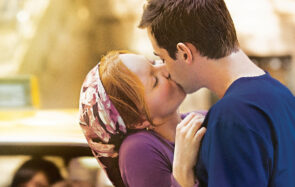Would you want your kid on a Wheeties box, Renee Septimus wondered here on Kveller. She talked about the kind of things that young Olympic athletes must be giving up to acheive their level of success–school, summer camp, birthday parties, etc.
Renee concluded: I’m glad my children lived “average” lives. They turned into well-rounded, self-actualized adults with many interests, good relationships, and satisfying careers.
As someone who spent several years covering Olympic sports for ABC, ESPN, and TNT, as the older sister and official chaperone of a brother who was the 1996 US Novice Ice Dancing Champion and, last but not least, a mom, myself, I have a different perspective on the subject.
First of all, the myth that elite athletes can’t grow up to become well-rounded, self-actualized adults with good relationships and satisfying careers is quite simply that–a myth. Sure, some former stars fail to find themselves after the spotlight spins elsewhere, fading into drugs, desperate self-destructive behavior, and even suicide. But, so do everyday people who never stepped near a gym mat or swimming pool.
Alternatively, when you spend many hours a day locked inside a tiny TV announcer booth with former Olympic champions month after month, year after year, you get to know them pretty well. And while I can report that Peggy Fleming, Dick Button, and Brian Boitano have their personal quirks, I can also say that they are interesting people who live full lives, which include parenthood, non-sport hobbies (Brian has his own cooking show now!) and professional success in a variety of fields on and off the ice. (So do folks like Mary Lou Retton, who is exactly like you would expect her to be even 20+ years after her own Wheeties box appearance. She bounded up to introduce herself to me at the 1998 Olympics with a big smile and a perky, “Hi! I’m Mary Lou!” I was tempted to reply, “Hi, I’m Alina, and you must think I was in a coma all through 1984.” But, I didn’t. Because that would have been rude. And she was just so damn nice.)
Secondly, I reject the notion of there even being such a thing as a “typical” childhood. All you need to do is look at the tiny microcosm that is Kveller to see that what one mom considers absolutely vital to raising a healthy, intelligent, emotionally available child varies wildly from one poster to another (not to mention their varying definitions of healthy, intelligent, and emotionally available). As we debate epidural or not, breast or bottle, private school or public, city or suburbs, siblings or only child, one religion or many, stay home or see the world, single parents, married parents, older parents, working parents, gay parents… the one thing we should be able to agree on, in the words of that great philosopher, Alan Thicke, who wrote the theme song to Diff’rent Strokes: Oh, the world don’t move to the beat of just one drum/What may be right for you/May not be right for some.
When my brother was skating competitively from the ages of 12 to 19, he may not have had the exact same experience as other kids. But, does different necessarily mean lesser? He went to summer camp. Only it was skating camp. He went to parties and dances. Only they were held at championship events. He made friends among his training mates and even his competitors. Friends he still keeps in touch with to this day. He also ate healthily, exercised, and traveled the country. He learned how to work hard, to apply himself, to make and stick to a schedule, to budget his time wisely, to get along with others (when everyone around you has knives strapped to their feet, you learn not to piss them off), and to take responsibility for his own actions, win or lose–skills it takes some people much longer to pick up. (He also mastered less vital ones, like polishing skating boots, steaming wrinkles out of clothes in the shower, and requesting hotel rooms as far away from the ice machine as possible.)
Which brings me to my final point. Instead of focusing on what’s lost, let’s look at what’s gained.
Earlier, I wrote about my middle son getting the chance to appear at the Met in their production of Giselle. Yes, I pulled him out of school early. Yes, he stayed up late and woke up tired the next day. But, oh, my goodness, the memories he made! He’s still talking about it! The idea that an 8-year-old boy had the chance to not only cross the stage of one the greatest theaters in the world, but that he was treated as a fellow professional by adults at the top of their field, not to mention the stage managers, and the costumers, and the make-up people… who among us will ever experience that in their entire lifetime, much less as a second-grader?
Anybody can go to a birthday party. Not everybody gets to perform in front of thousands of people. Some go their entire lives without experiencing a dream fulfilled. Yes, your greatest achievement may happen when you’re 22. Or 18. Or 15. But, at least it did happen. Not everybody can say that.
To me, the entire point of being alive is to have experiences (good and bad). Remember, I’m the one who wants my kids to fail as often as possible. And that means not shirking away from the most extraordinary experiences of all. In fact, considering my stance on standing out from the crowd, I kind of race towards them. And, for as long as I have any say in the matter, I am urging my kids to do the same.
So would I encourage any of my three children to give up a “normal” childhood for a “different” one? If that’s what they really wanted, sure. But, because I know exactly how difficult it is to be the parent or guardian of such a child (for the record, I saw nothing wrong with how Aly Raisman’s folks behaved. I’ve gotten nervous for athletes I only know on a casual basis. If I were their mom… oy!), I would have my aspiring stars wait until they were old enough to do the heavy lifting–like transportation, keeping a schedule and, most importantly, sitting around for multiple, dull hours while the kids practice–themselves. And while I can testify that a majority of elite athletes aren’t too overly scarred by their experiences, I can’t say the same about their parents.









